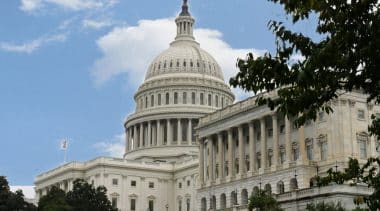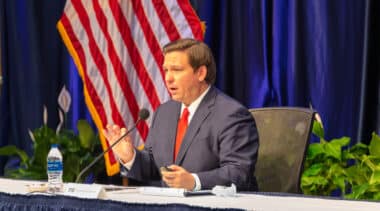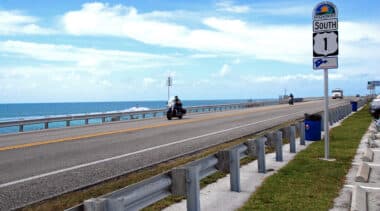Adrian Moore, Ph.D., is vice president of policy at Reason Foundation.
Moore leads Reason's policy implementation efforts and conducts his own research on topics such as privatization, government and regulatory reform, air quality, transportation and urban growth, prisons and utilities.
Moore, who has testified before Congress on several occasions, regularly advises federal, state and local officials on ways to streamline government and reduce costs.
In 2008 and 2009, Moore served on Congress' National Surface Transportation Infrastructure Financing Commission. The commission offered "specific recommendations for increasing investment in transportation infrastructure while at the same time moving the Federal Government away from reliance on motor fuel taxes toward more direct fees charged to transportation infrastructure users." Since 2009 he has served on California's Public Infrastructure Advisory Commission.
Mr. Moore is co-author of the book Mobility First: A New Vision for Transportation in a Globally Competitive 21st Century (Rowman & Littlefield, 2008). Texas Gov. Rick Perry said, "Speaking from our experiences in Texas, Sam Staley and Adrian Moore get it right in Mobility First." World Bank urban planner Alain Bartaud called it "a must read for urban managers of large cities in the United States and around the world."
Moore is also co-author of Curb Rights: A Foundation for Free Enterprise in Urban Transit, published in 1997 by the Brookings Institution Press, as well as dozens of policy studies. His work has been published in the Wall Street Journal, Los Angeles Times, Boston Globe, Houston Chronicle, Atlanta Journal-Constitution, Orange County Register, as well as in, Public Policy and Management, Transportation Research Part A, Urban Affairs Review, Economic Affairs, and numerous other publications.
In 2002, Moore was awarded a World Outsourcing Achievement Award by PricewaterhouseCoopers and Michael F. Corbett & Associates Ltd. for his work showing governments how to use public-private partnerships and the private sector to save taxpayer money and improve the efficiency of their agencies.
Prior to joining Reason, Moore served 10 years in the Army on active duty and reserves. As an noncommissioned officer he was accepted to Officers Candidate School and commissioned as an Infantry officer. He served in posts in the United States and Germany and left the military as a Captain after commanding a Heavy Material Supply company.
Mr. Moore earned a Ph.D. in Economics from the University of California, Irvine. He holds a Master's in Economics from the University of California, Irvine and a Master's in History from California State University, Chico.
-
Florida Amendment 1 (2022): Disregard flood resistance improvements in property value assessments
Amendment 1 would add flood damage protection to the list of things the state legislature can exempt from property taxes.
-
The 2022 ballot initiatives about consumer freedom issues
Reason Foundation's policy analysts are examining statewide ballot initiatives on issues related to consumer freedom, including, sports gambling, flavored tobacco and e-cigarettes, wine and alcohol sales, and more.
-
Voters’ guide to the 2022 Colorado ballot initiatives
Reason Foundation's policy analysts are examining some of the statewide initiatives on Colorado's ballot in November 2022.
-
Voters’ guide to Georgia’s statewide ballot questions (2022)
Examining some of the statewide ballot measures on the Georgia ballot in November 2022.
-
Testing mileage-based user fees as a replacement for Georgia’s gas tax
Georgia’s highways need a new, sustainable funding source.
-
Social media companies are free to make bad decisions
Social media companies are free to set their terms of service and moderate content as they choose. But this doesn’t mean their policies are smart.
-
K-12 open enrollment is breaking down barriers in Florida
Open enrollment ends the monopolies school districts maintain through residential assignment.
-
The growing need to structurally address the national debt
As the national debt nears $29 trillion, the conversation about this problem needs to change.
-
How California’s recall election might change the state’s course on infrastructure
The increasingly sorry state of some of California's infrastructure is a key issue for many Californians.
-
As Commercial Space Travel Becomes Reality, Debris and Space Traffic Management Becomes More Important
If the government works with private industry through strategic public-private partnerships, the U.S. can best address the threats posed by orbital debris and create sustainable policies for safe space exploration.
-
Florida’s Social Media Law Is Unconstitutional
As this social media bill worked its way to the governor’s desk, it was widely pointed out that these restrictions are blatantly unconstitutional.
-
More Accountability and Police Improvements Are Needed in Michigan
This is an opportunity for Michigan to promote good law enforcement from multiple angles.
-
How Florida Can Use Mileage-Based User Fees to Fund Roads
Florida would need to raise its state gas tax over 75 cents a gallon by 2050 just to keep revenue even with today's levels.
-
Florida Protected Public Health by Rejecting Vaping Ban
The DeSantis administration refused to be taken in by moral panic and public health and the state's small businesses are both better off for it.
-
Testimony: Public-Private Partnerships Can Leverage Infrastructure Investment
Public-private partnerships can offer a way to finance major highway and infrastructure projects that otherwise might not be pursued due to a lack of funding.
-
Examining Mileage-Based User Fees As a Replacement for Gas Taxes
Replacing fuel taxes with distance-based fees is being tested in the U.S. and overseas.
-
An Overview of Mileage-Based User Fees: A Potential Replacement for the Fuel Tax
Road usage charges should replace fuel taxes, not supplement them.
-
The Challenges and Opportunities Ahead For U.S. Infrastructure
Why Congress and state governments have struggled to properly prioritize and pay for infrastructure projects and what can be done to change that.


















